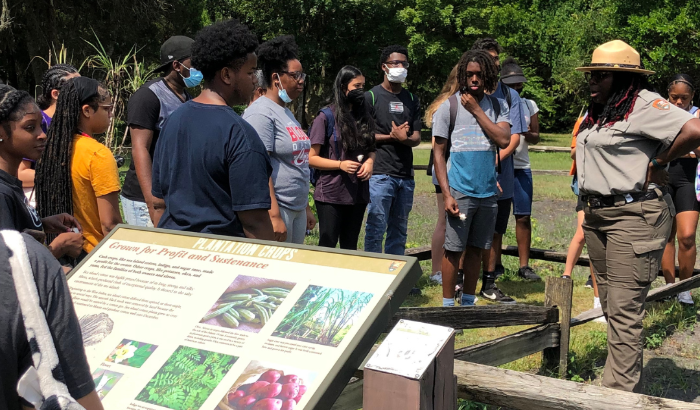June 24, 2022 – Tucked away on Jacksonville’s Northside is the oldest plantation house in the state of Florida and a place where enslaved people were voiceless. Now, students are working to make sure their stories are told.
As part of the district’s Summer African American History Writing Institute program, students visited Kingsley Plantation this week, getting an up-close look at the lives of slaves and slave owners who once called Northeast Florida home.
“My personal experiences in spaces like this, they make me feel emotionally connected to my history,” said Kasyn Jones, one of several recent graduates who are serving as interns in the summer program. “It allows kids to have kind of an understanding of where we have been, what we have come from, and the different forms our lives could have taken.”
Jones and her peers had the opportunity to tour the grounds, walking through slave cabins known as “tabby homes” which were built by enslaved people using oyster shells harvested on the island.
They were also able to physically grasp aspects of a painful history in the form of the Sea Island cotton, which was picked by slaves and served as the primary product of the plantation.
Rangers on the plantation showed students artifacts like broken bottles and pieces of a plate left behind by slaves and slave owners. These are examples of what teachers like Jeenecy Griffin want their students to see.
“A lot of times we’re not able to take our students and allow them to see history itself,” said Griffin, a history teacher at Raines High School.
But through experiences like these, Griffin said, students gain direct access to a rich history.
“Hopefully they can take it and spread it out into the community,” she said.
And that serves as the goal of this summer program. Touring Kingsley Plantation is one of many opportunities that students will have to learn more about local African American history during the three-week program.
Other opportunities include visiting a cemetery where notable black residents are buried and researching archives at Jacksonville’s main library. They will then create history lessons or videos that can be used by DCPS teachers in the classroom.
This resonates for students like upcoming Paxon junior Taylor Ramos who is eager to learn more about the real lives of slaves.
“I want to make it real for kids and humanize slavery,” said Ramos.
Upcoming junior at Atlantic Coast High, Akilah Prier, agrees.
Prier was struck by the story of a black slave named Anna, who was brought to the plantation at age 13 and later went on to marry the plantation owner, Zephaniah Kingsley. She eventually became a property owner and slave owner.
Her story, said Prier, brings another layer of complexity to the lives of slaves and people of color, beyond what is commonly taught.
“There was a lot more to it,” said Prier. “So, it’s very important that we put that story in there. It’s a huge part of history.”
For Jones, this experience helped her see enslaved people who lived and worked at the Kingsley plantation as people with agency despite their enslavement.
“I found it really interesting how the enslaved people here were allowed to maintain their own culture to a degree, and how they had control over their burials, their religion, how they practiced, and even over how their houses were arranged in that way,” said Jones. “We were able to retain a sense of cultural identity, even if they did not have their freedom.”








